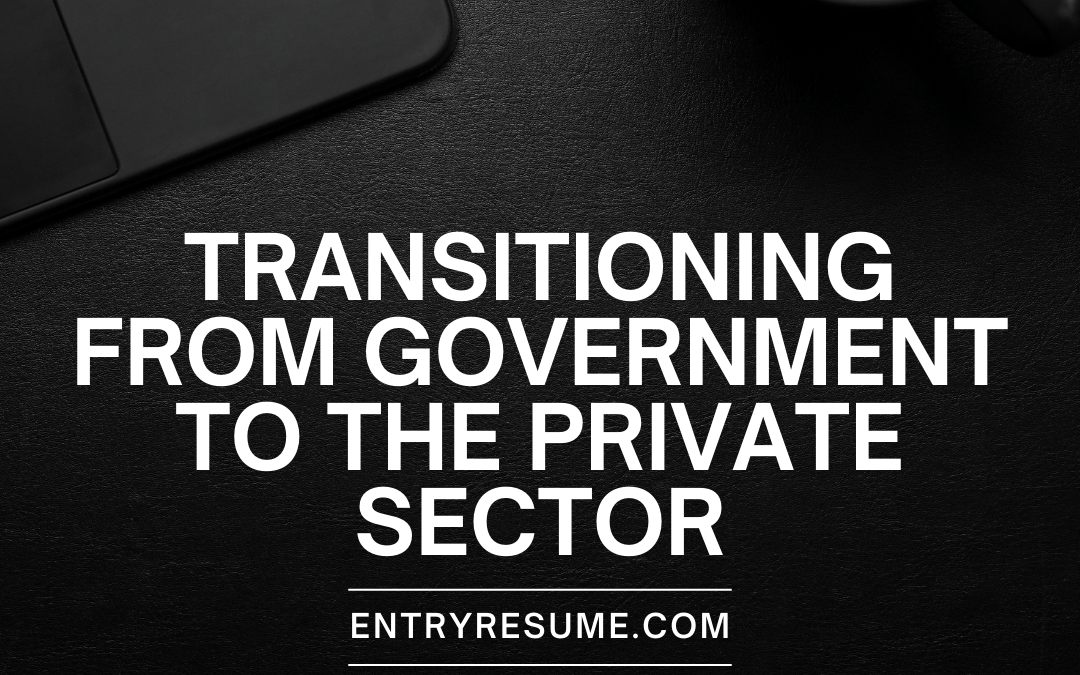Moving from a government position to the private sector is a significant career shift, but it can open the door to exciting opportunities, increased earnings, and greater career flexibility. While working in government has its own perks, the private sector offers a different kind of professional landscape. If you’re considering making the move, here are some key benefits of transitioning to private industry.
Higher Earning Potential
One of the most compelling reasons to leave a government job for the private sector is the opportunity for increased compensation. Government salaries are often capped by budget constraints and standardized pay scales, making it difficult to earn significantly more without moving up through the ranks. The private sector, on the other hand, rewards performance and expertise with competitive salaries, bonuses, stock options, and other financial incentives. Professionals with specialized skills—especially in IT, cybersecurity, project management, and consulting—can often see substantial salary increases after transitioning. Entry Resume LLC has experience in creating resumes for all of these fields.
More Career Growth Opportunities
Government roles tend to follow a rigid structure with promotions based on tenure rather than performance. While this can provide stability, it may also limit career progression. In contrast, the private sector values results and innovation, making it easier for professionals to advance based on merit. Employees who perform well can quickly move up the ladder, take on leadership positions, and negotiate better pay and benefits.
Greater Flexibility and Work-Life Balance
Private sector roles often provide more flexibility in terms of remote work, hybrid schedules, and project-based employment. Many companies have embraced remote work policies, allowing employees to choose work arrangements that fit their lifestyle. Government positions typically require employees to follow strict schedules, and remote work options can be limited. In the private sector, professionals often have the chance to find jobs that align better with their personal and family commitments.
Access to Innovative Work Environments
While government agencies play a crucial role in maintaining stability and regulation, they often lag behind in adopting new technologies and innovative practices due to bureaucratic processes and budget constraints. Private companies, especially those in the tech, finance, and healthcare industries, are at the forefront of innovation. Employees in these sectors get to work with the latest technology, cutting-edge strategies, and industry leaders who drive change.
Increased Networking and Industry Exposure
The private sector thrives on connections and networking. Unlike government roles, which are often confined within a specific agency or department, private sector jobs expose professionals to a vast network of industry experts, clients, and business leaders. This can lead to new career opportunities, mentorship relationships, and even entrepreneurial ventures down the road. If you’re looking to expand your professional circle and gain industry recognition, the private sector offers more avenues to do so.
Entrepreneurial and Consulting Opportunities
For government employees who want to leverage their expertise in a new way, the private sector provides the perfect launchpad for consulting, contracting, or even starting their own business. Many professionals transition into advisory roles, leveraging their government experience to assist corporations with compliance, strategy, and operational improvements. Whether it’s working for a consulting firm or starting an independent business, the private sector provides more autonomy to shape your career path.
Ability to Work for Mission-Driven Companies
Many government employees are drawn to public service because they want to make a difference. The good news is that the private sector is filled with mission-driven companies, from non-profits to sustainability-focused organizations and companies with strong social responsibility programs. Many of these businesses work closely with government agencies, allowing professionals to continue making an impact while enjoying the benefits of private industry employment.
How to Make a Smooth Transition
If you’re considering moving from government work to the private sector, here are some steps to ease the transition:
- Update Your Resume – Tailor your resume to highlight transferable skills such as leadership, problem-solving, and project management. We can help you with this, using ATS optimization to give you the best chance of being seen by recruiters.
- Leverage Your Network – Connect with former colleagues who have successfully transitioned and ask for insights or referrals.
- Research the Industry – Understand the expectations, salary ranges, and key skills needed in your desired field.
- Upskill if Necessary – Consider certifications or additional training to align with industry standards.
- Prepare for a Different Work Culture – Be ready for a faster-paced, results-driven environment with different expectations for performance and accountability.
Make the Change Today
Transitioning from a government role to the private sector can be a game-changer for professionals looking for higher earnings, faster career growth, and more flexibility. While it may require some adjustments, the long-term benefits often outweigh the challenges. If you’re ready to take the next step, start by refining your resume, expanding your network, and exploring industries that align with your skills and interests.
Looking for help with your resume, cover letter, or LinkedIn account? Visit EntryResume.com to get assistance tailored to your transition from government to private industry!

